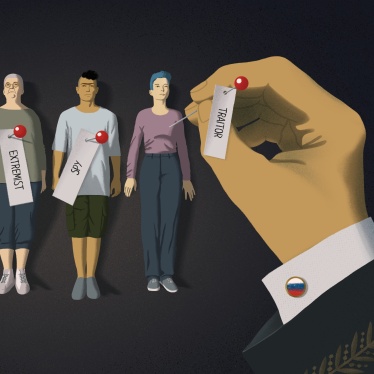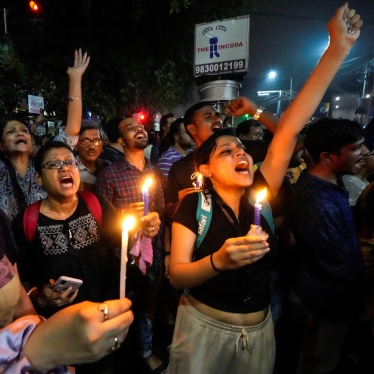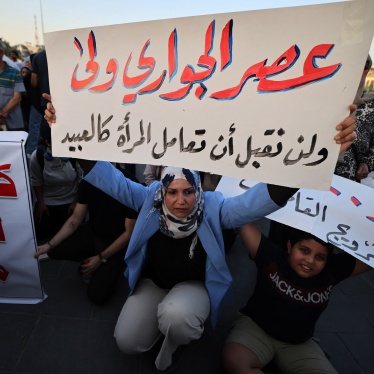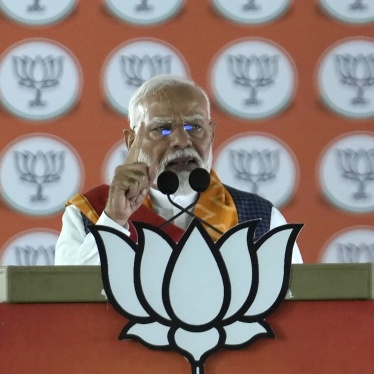Human Rights Watch is writing to express profound concern at today’s ruling by the Special Economic Court in Almaty to liquidate the political party Democratic Choice of Kazakhstan (DVK) on the rationale that a statement by the party posed a threat to national security. This move reverses one of the most significant steps toward democratic reform taken by your government in recent years.
I am writing to express Human Rights Watch’s profound concern at today’s ruling by the Special Economic Court in Almaty to liquidate the political party Democratic Choice of Kazakhstan (DVK) on the rationale that a statement by the party posed a threat to national security. This move reverses one of the most significant steps toward democratic reform taken by your government in recent years. It represents a blow to the promotion of political pluralism in the country. We ask that, pending appeal, your government withdraw the petition for liquidation of the DVK.
The closure of DVK appears to be part of a government backlash in reaction to events in Ukraine. It will no doubt cripple the political opposition in advance of presidential elections in Kazakhstan, scheduled for 2006. This in turn will compromise the spirit of pluralism of the forthcoming election.
The court ruling followed civil charges brought by the Almaty city prosecutor’s office, accusing the DVK of having violated the constitution and other legislation of Kazakhstan, specifically article 5 of the Law on National Security. Article 5, paragraphs 5 and 6, of that law forbids “inciting social tension in the society” and “political extremism.” The DVK was also charged with having violated article 5, paragraph 3 of the Constitution, article 5 of the Law on Public Associations, and article 5 of the Law on Political Parties, which prohibit the activity of public associations that “...aim at disrupting the security of the state and inciting social tension in the society.”
As evidence of the DVK’s alleged violation of the law the prosecution cited a statement issued by the DVK at its second party congress on December 11, 2004. This document said that the conduct of the parliamentary elections of September 2004 had “dashed the last hope for the possibility of political reform” in Kazakhstan. It said the party does not view the existing government of Kazakhstan—either its president or parliament—as legitimate. The statement further called on suitable segments of society to take decisive action, including civil disobedience, in protest.
The prosecutor reportedly charged that the stated goals of the DVK “…are aimed at disorganizing the activities of state bodies, disrupting their continuous functioning and decreasing the level of the country's controllability, which is a threat to national security under article 5 of Kazakhstan's Law on National Security.” The city prosecutor allegedly further characterized such imputed actions as “political extremism,” also defined in article 5 as a threat to national security. A press release issued by the prosecutor’s office reportedly predicts that the DVK’s actions could, in the future, cause “such negative consequences as mass disturbances, damage to people's health and lives, their property, state-owned and private property, and a disruption in the work of state agencies and economic entities.”
Judge Gulnar Meyrzhanova’s verdict reportedly stated that the DVK’s December 11 statement “induces citizens to…acts of disobedience” and “kindles social [discord].” In the end, on the sole basis of the DVK statement, the judge granted the prosecutor’s request to liquidate the party.
A DVK representative told Human Rights Watch that party members have complied with the court’s decision, but that they will file an appeal.
As a nonpartisan organization, Human Rights Watch has no view on the content of the DVK statement. But we believe that the court’s ruling uncritically accepts the state’s argument equating the call for peaceful civil disobedience with specific acts interrupting the functioning of the state. There is no evidence that in fact the DVK statement has caused any social disruption or illegal acts.
Human Rights Watch is also concerned that the government deliberately chose to seek liquidation of the party rather than more normal administrative measures to halt the behavior it deemed unlawful. Experts on the Kazakh legal system have pointed out that the issue would more appropriately have been dealt with under provisions of the country’s administrative code and is not rightly the subject of a civil case. Leading rights defender Evgeni Zhovtis, head of the Kazakhstan Bureau of Human Rights and the Rule of Law, has said, “if a political party violates legislation only an administrative court can stop or ban its activity.” This suggests that the authorities were seeking the more punitive option, liquidation of the party, rather than a milder remedy such as an administrative decision to stop the party’s activity until a resolution could be reached.
The DVK has stated also that the court failed to follow the Civil Procedural Code by denying a continuance when the party’s legal representative, Asylbek Kozhakhmetov, took ill and was unable to attend the final hearing.
The Kazakh government has a history of seeking to prevent the DVK from entering electoral politics by denying it registration on petty grounds, harassing its members, and imprisoning its co-founders, Galymzhan Zhakianov and Mukhtar Abliazov. Our April 2004 report on Kazakhstan, based on months of field research, documented these actions, which we believe were intended to prevent DVK from fielding candidates in the September 2004 parliamentary elections. While ultimately DVK was granted registration, the integrity of the election itself was compromised by the government’s failure to establish a level playing field, for which it was sharply criticized by the Organization for Security and Cooperation in Europe.
In light of this history, Human Rights Watch is concerned that the closure of the DVK is politically motivated and damaging to the development of political pluralism in Kazakhstan. We again urge the government to withdraw the petition for liquidation of the DVK.
Sincerely,
Rachel Denber
Acting Executive Director
Europe and Central Asia division





